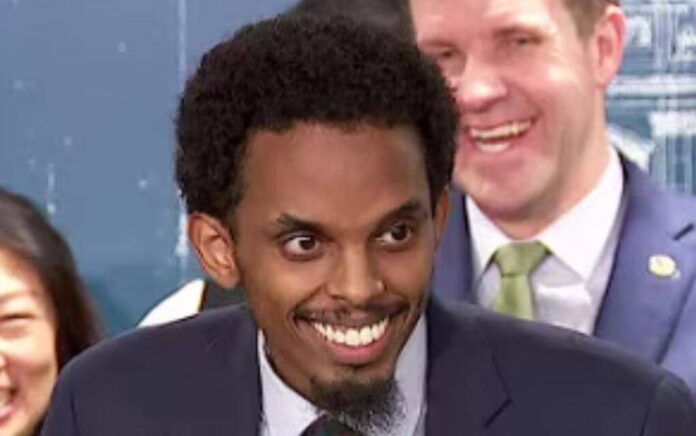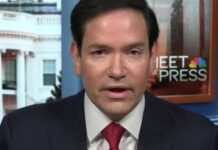
The Democrats are in a bind. They must turn things around and fast.
And that’s why the Democrat Party has thrown a hail mary with this sudden change of course.
Socialist Candidate’s Endorsement Yanked Amid Voter Concerns
The Minnesota Democratic-Farmer-Labor Party (DFL) has pulled the plug on its endorsement of state Sen. Omar Fateh, a self-proclaimed democratic socialist, for Minneapolis mayor. The decision, announced Thursday, August 21, 2025, comes after a review panel uncovered what they called “substantial failures” in the voting process at last month’s chaotic city convention.
This move strips Fateh of critical party resources and exposes the growing rift between the DFL’s radical left and its more grounded, centrist members. For hardworking Americans, this saga is yet another red flag about the Democrats’ dangerous flirtation with socialist policies that threaten the economic freedom and prosperity we hold dear.
Fateh, who’s challenging the more pragmatic incumbent Mayor Jacob Frey, had initially clinched the Minneapolis DFL’s endorsement—the first for a mayoral candidate since 2009, according to The New York Times. But the victory was short-lived. State party officials stepped in, citing a litany of problems at the July 19 convention, including a botched online voting system that led to a “substantial undercount” in the first ballot.
The mess even disqualified a third candidate, DeWayne Davis, from moving forward, raising serious questions about the integrity of the process. To top it off, a registration check-in sheet was left unsecured, creating opportunities for tampering with ballot ID numbers. While no campaign was directly implicated, the state DFL wasn’t taking any chances and revoked Fateh’s endorsement.
Frey, who lodged a formal complaint about the convention’s fairness, didn’t hide his relief. “I am proud to be a member of a party that believes in correcting our mistakes, and I am glad that this inaccurate and obviously flawed process was set aside,” he said. Meanwhile, Fateh’s camp cried foul, with co-campaign manager Graham Faulkner blasting the decision as “disenfranchisement of thousands of Minneapolis caucus goers and the delegates who represented all of us on convention day.”
Faulkner went further, accusing the party establishment of being “threatened by our message.” What’s that message? A radical agenda that smells like socialism, complete with plans to hike taxes on the wealthy, cap rents, and shake up public safety in ways that many Americans fear could destabilize communities.
Fateh, often compared to New York City’s democratic socialist mayoral nominee Zohran Mamdani, wants to transform Minneapolis into a laboratory for progressive pipe dreams. Both men, young Muslim lawmakers with African roots, champion taxing the rich to fund massive housing projects, imposing rent controls, and redirecting public safety resources—moves that critics argue prioritize ideology over practicality. These ideas aren’t new; they’re recycled from the same playbook that’s left countries like Venezuela and Cuba in economic ruin, and Americans are rightly nervous about seeing them take root here.
Why the unease? Look at the track record. Socialist-leaning policies, like those Fateh and his allies push, often promise utopia but deliver misery. Take rent control, a cornerstone of Fateh’s platform. Studies, like one from the Brookings Institution in 2019, show that rent caps in places like San Francisco and New York have driven up housing costs for everyone else by limiting supply and discouraging new construction. The wealthy still find ways to game the system, while middle-class families and small landlords get squeezed.
Fateh’s call for a $20 minimum wage by 2028 might sound generous, but it ignores the reality faced by small businesses already struggling with inflation and regulatory burdens. A 2021 study by the University of California, Riverside, found that minimum wage hikes in Seattle led to reduced hours and job losses for low-wage workers—the very people these policies claim to help.
Then there’s the public safety angle. Fateh’s push to ban Minneapolis police from cooperating with Immigration and Customs Enforcement and his past support for a 2021 ballot initiative to replace the police department with a vague “Department of Public Safety” raise alarm bells. After the chaos following George Floyd’s death in 2020, Minneapolis residents know all too well the consequences of undermining law enforcement.
Crime rates spiked in the city, with violent crime up 17% from 2019 to 2022, according to Minneapolis Police Department data. Americans aren’t naive—they see how defunding or hamstringing police forces in the name of “progress” often leaves communities vulnerable, especially in working-class neighborhoods that can’t afford private security.
The economic plans floated by Democrats like Fateh aren’t just local experiments; they’re part of a national trend that’s got Main Street America on edge. Kamala Harris’s 2024 campaign, for instance, toyed with ideas like price controls on groceries and pharmaceuticals, which economists across the spectrum—from the conservative Heritage Foundation to the liberal Center for American Progress—warned could lead to shortages and black markets, much like in socialist Venezuela.
A 2023 Gallup poll found that 65% of Americans believe the government has too much control over the economy already, and only 36% view socialism favorably. The specter of centralized planning, wealth redistribution, and government overreach feels like a betrayal of the free-market principles that built America’s prosperity.
Fateh’s vision, like that of his ally Mamdani in New York, leans heavily on taxing the wealthy to fund sprawling social programs. But history shows that soaking the rich rarely works as planned. When France imposed a 75% supertax on high earners in 2012, thousands of wealthy citizens fled the country, taking their capital and jobs with them, according to a 2016 report by the French government.
The policy was repealed after it backfired, costing more in economic damage than it raised in revenue. Americans, especially small business owners and entrepreneurs, worry that similar policies here would choke innovation and punish success, driving investment overseas and leaving workers with fewer opportunities.
The DFL’s decision to yank Fateh’s endorsement also highlights the party’s internal chaos. The Minneapolis DFL has a history of botched conventions, with some in recent years descending into disputes and even violence. On Thursday, state party officials slapped the city chapter with a two-year probation, demanding oversight and compliance plans to clean up their act.
Frey, a self-described “pragmatic progressive,” has positioned himself as a bulwark against the radical left. He’s navigated Minneapolis through turbulent times, including the COVID-19 pandemic and the 2020 riots, though not without criticism. His veto of a 2024 City Council resolution calling for a Gaza ceasefire, which he called one-sided, drew ire from progressives like Fateh but showed his willingness to stand up to the far left.
Frey’s campaign argues that the mayoral race should be decided by all Minneapolis voters in the nonpartisan November election, not a small cadre of party insiders. In a city that leans heavily Democratic, that’s a call for common sense over ideological purity.
Fateh’s supporters, including progressive “Squad” member Rep. Ilhan Omar, are framing the revocation as an attack on democracy itself. Omar called it “inexcusable” and accused a “small group, a majority living outside Minneapolis,” of overturning the will of local delegates. But this narrative conveniently ignores the documented failures of the convention process. The state DFL’s report didn’t just point to technical glitches—it noted that the unsecured registration sheet created opportunities for fraud, even if no campaign was directly blamed. For voters already skeptical of elite insiders, this smells like the kind of backroom maneuvering that fuels distrust in institutions.
The bigger picture here is why Americans are so jittery about the Democrats’ leftward lurch. The party’s embrace of figures like Fateh and Mamdani signals a shift toward policies that prioritize ideology over results. A 2022 Pew Research Center survey found that 60% of Americans believe the government should focus on practical solutions rather than ideological battles.
Yet Democrats seem intent on doubling down, pushing ideas like wealth taxes and universal basic income that sound good on paper but crumble under scrutiny. The Congressional Budget Office projected in 2020 that a wealth tax, like the one proposed by Sen. Elizabeth Warren, would raise far less revenue than promised while slowing economic growth by discouraging investment.
For the average American, this isn’t abstract theory—it’s about paychecks, groceries, and safety. Inflation, which hit a 40-year high of 9.1% in 2022, has already eroded wages, with real disposable income declining 2.3% that year, per the Bureau of Economic Analysis. Policies that promise “free” housing or wages through government mandates often end up hiking taxes or prices for everyone else.
Small business owners, who employ nearly half of America’s workforce according to the Small Business Administration, can’t absorb these costs without cutting jobs or raising prices, further squeezing families already stretched thin.
The Minneapolis mayoral race, set for November 4, 2025, will be a test case. Without a primary, voters face a stark choice between Frey’s centrism and Fateh’s radical vision. Fateh’s loss of the DFL endorsement levels the playing field, stripping him of access to voter databases and party funds that could have given him an edge.
But his campaign’s defiance—vowing to “win” despite the setback—shows the left’s determination to push forward, no matter the cost. For conservatives and independents, this is a wake-up call: the socialist wave isn’t just a coastal phenomenon; it’s knocking on the heartland’s door.



















